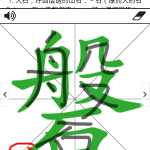Articles tagged with ‘Spaced repetition software’
-
Why flashcards are terrible for learning Chinese
Flashcards are often viewed as a silver bullet, promising swift mastery of characters, words and more, but relying on flashcards too much has serious drawbacks, and if you’re not careful, they can hinder more than they help.
Read → -
Why spaced repetition software is uniquely well suited to learning Chinese characters
While spaced repetition software can be very useful, it also has some serious drawbacks. Fortunately, most of them don’t apply to learning to write Chinese characters!
Read → -
Diversify how you study Chinese to learn more
How is it possible to spend 80 hours a week learning Chinese? And what can you learn from that, even if you find it hard to find any time to study whatsoever, with work and family taking up most of your time? This article aims at widening the scope of what it means to learn Chinese, and shows you ways you can learn that you probably haven’t thought of before!
Read → -
When spaced repetition fails, and what to do about it
Spaced repetition software can boost your vocabulary learning significantly. The idea is to schedule each review as late as possible, but not so late that you forget the answer. This sounds good in principle, but when it comes to learning languages, just barely being able to come up with the right word is not enough!
Read → -
Should you focus on learning Chinese words or phrases?
When learning Chinese, should you focus mainly on learning words or phrases? This question is not easy to answer and depends on a number of factors. This article breaks it down and discusses the pros and cons of each.
Read → -
About cheating, spaced repetition and learning Chinese
Have you even found yourself grading your answer slightly more positively than you should? Even though we all know that we shouldn’t, I think this is quite common. We shouldn’t do this! We’re only cheating ourselves and impeding our progress. In this article, I talk a little about cheating, spaced repetition software and some related consequences and theories.
Read → -
Three ways to improve the way you review Chinese characters
In this article, I discuss three things you can do to improve the way you review characters, mainly focusing on avoiding rote learning, time quality and making sure your study method really prepares you for what you want to use your Chinese for. The article also contains a video about how to improve your character reviewing with Skritter!
Read → -
Flashcard overflow: About card models and review directions
The question of how to design flashcards is faced by all learners who use them. What should you put on the front? What should you put on the back? Should you add single characters or whole words? Or perhaps sentences are better? The general answer is that it depends and this article discusses some of the factors the answers depend on.
Read → -
If you think spaced repetition software is a panacea you are wrong
Spaced repetition software (SRS) is widely discussed online, and generally speaking, there is a spectrum between people who think SRS is the holy grail of learning anything and those that think SRS is artificial, passive and just a waste of time. This article argues that this polarisation is a serious mistake, SRS is a tool and like any other tool, how we use it determines what we get from it.
Read → -
Is your flashcard deck too big for your own good?
If you use spaced repetition software like Anki for learning Chinese and do so for a few years, you will end up with a very large flashcard deck. Some people advocate deleting the deck if it becomes too big. This article looks closer at the pros and cons of keeping large decks and why you might want to consider starting over from scratch.
Read →









